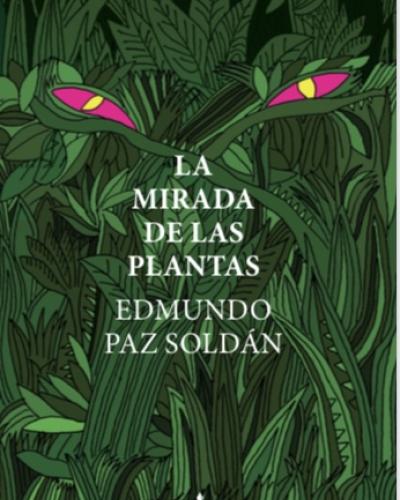 Department Homepage
The College of Arts & Sciences
Department Homepage
The College of Arts & Sciences

La Mirada de las Plantas
From the publisher:
In this novel, the extractivist past and present of the Amazon intermingle within the framework of a disturbing environment. Fleeing the scandal, Rai, the son of a beauty pageant entrepreneur in decline, travels to Santa Rosa–a small Bolivian town on the border with Brazil, in the Amazon–, to work in a laboratory with the enigmatic doctor Dunn, who is mourning the disappearance of his son and daughter: two years ago his estranged wife ran away with them, not to be seen again. Doctor Dunn is in charge of a controversial experiment that involves alita del cielo–a hallucinogenic plant traditionally used in indigenous communities–and virtual reality. A Brazilian virtual reality company, Tupi VR, wants to offer the experience of “being drugged without using drugs:” replicating through virtual reality the experience of taking different sorts of drugs–LSD, mushrooms, alita del cielo.
As part of the experiment, the volunteers–Indigenous and low-income people from Santa Rosa and other border towns in the Brazilian side–, are given a dosage of alita del cielo, and, under its effects, they have to report on their visions so the engineers of the company can try to replicate them through virtual reality. The volunteers are given strong dosages and experiment bad trips, especially Alvarenga, a member of an Indigenous community which was kept under a state of forced indenture in the jungle, and who able to flee from his exploiters: he reports seen visions of the Giant, the exploiters’ foreman; he even reports seeing him awake. The experiment begins to get out of hand, as it seems that the hallucinations are not only related to individual experiences but to the traumatic past of abuse and extractivism in the Amazon (Santa Rosa was once the center of the rubber trade in the region.) Meanwhile, Rai, who was supposed to be in charge of the volunteers, gets hooked on alita del cielo as well, as starts seeing visions awake. He discovers that seeing visions awake, a sort of trip that never ends, is an illness reported in the region by some people who overdose on alita and known as “the Disorder.”
The doctors and volunteers who are part of the experiment, isolated in that border place that was once the center of the rubber trade in the region, wander around through a fragile psychic zone, where the boundaries between sanity and madness are blurred. The dark side of Rai is revealed–he doesn’t respect the privacy of his patients, he is prone to film them and create deepfakes with the images–, as well as Dunn’s real objectives: through virtual reality, he wants to understand what happened to his son and daughter, and through alita del cielo, he intentionally wants to see if he can provoke the “Disorder,” to have his son and daughter with him all the time as permanent visions. Tupi VR also has its own objectives: virtual reality is a way to enter the clients’ unconscious so it can later offer them for sale their deepest desires, some unknown to them.
The novel explores the very nature of reality as revealed by plants and technology, while at the same time connecting different forms of extraction today–the riches of the forest, our most private desires–, with the traumatic past of abuse and exploitation in the Amazon. Edmundo Paz Soldán creates a mesmerizing narrative in which the jungle becomes a space for fantasy and experimentation, reality is a virtual construction, the company that manages the laboratory knows more about the volunteers than the volunteers themselves, and nature reveals itself as the most artificial of our constructions. The novel brilliantly puts together a wide range of literary motifs to ask urgent questions about our time, in which the seductive power of screens ensnares us with its promises of satisfaction and fulfillment, and our reckless actions destabilize the ecosystems where we live.